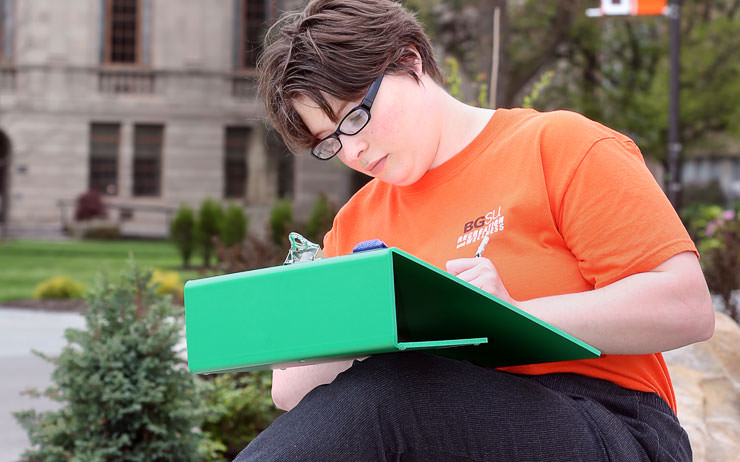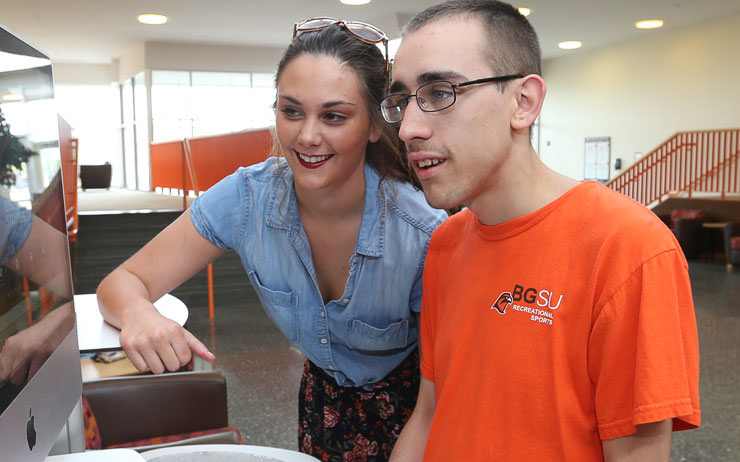Graduate Programs in Special Education
Online Programs
The BGSU School of Inclusive Teacher Education (SITE) offers online graduate programs leading to a Master of Education (M.Ed.) in Special Education and university certificates. Master’s degree specializations are available in Applied Behavior Analysis, Assistive Technology, Autism Spectrum Disorders, and Secondary Transition. Graduates are prepared to become leaders in the field and advocates for individuals with disabilities.
Applied Behavior Analysis

The Applied Behavior Analysis (ABA) Program is intended for individuals interested in professional careers in education, healthcare, or other fields in which they work with children, adolescents, and/or adults who have behavioral challenges. The program provides preparation towards the Board-Certified Behavior Analyst (BCBA) credential.
Programs offered: M.Ed. | Graduate Certificate
Program questions: Eric Anderson, Ph.D., 419-372-7794, ericja@bgsu.edu
Assistive Technology

Students in the Assistive Technology Program develop the skills needed to work effectively with individuals who utilize assistive technology, their parents, teachers, professionals, and school districts seeking to introduce assistive technologies into multiple environments.
Programs offered: M.Ed. | Graduate Certificate
Program questions: Dr. Ashley Ajemigbitse (McCoy), mccoyar@bgsu.edu, 419-372-7319
Autism Spectrum Disorders

The Autism Spectrum Disorders (ASD) Program prepares educators and related service professionals to identify, understand, program for, and effectively support individuals on the autism spectrum.
Programs offered: M.Ed. | Graduate Certificate
Program questions for Fall 2024 - Dr. Ashley Ajemigbitse (McCoy), mccoyar@bgsu.edu, 419-372-7319
Program questions for Spring 2025 Victoria VanUitert, vvanuit@bgsu.edu, 419-372-8291
Secondary Transition

The Secondary Transition Program equips educators, school counselors, and rehabilitation professionals to support the successful transition of youth with disabilities to college, careers, and adult life. Additionally, eligible Ohio educators can earn the Transition-to-Work (TTW) Endorsement.
Programs offered: M.Ed. | Graduate Certificate | TTW Endorsement
Program questions: Dr. Jeanne Novak, 419-372-6826, jnovak@bgsu.edu
Admissions
BGSU online graduate programs in special education use a holistic admissions review process. We value the diverse experiences, backgrounds, and individual perspectives applicants bring to our learning community. Every application is reviewed to gain insight into how an applicant’s academic preparation and experiences contribute to their interest and ability to be successful in graduate study at BGSU. Applications are accepted on a rolling basis with classes beginning in August, January, and May.
Graduate Assistantships
THE SCHOOL OF COUNSELING AND SPECIAL EDUCATION HAS AWARDED ALL GRADUATE ASSISTANTSHIPS FOR THE 2022-2023 ACADEMIC YEAR.
The School of Counseling and Special Education offers a limited number of scholarships and graduate assistantships to degree-seeking students engaged in full-time graduate study and who are available to work on campus. Graduate financial support is awarded based on the excellence of student credentials and the availability of funding. Eligibility is restricted to students with a minimum cumulative undergraduate GPA of 3.0 (or a minimum graduate GPA of 3.0 when graduate semesters hours are nine or greater).
Submit the Application for Graduate Funding
Alternative Resident Educator
Interested in becoming an Intervention Specialist in Ohio? Check out BGSU’s online Alternative Resident Educator Graduate Certificate Program to see if this may be the program for you.
Institutional Accreditation
Bowling Green State University [BGSU] is accredited by the Higher Learning Commission. BGSU has been accredited by the Higher Learning Commission since 01/01/1916. The most recent reaffirmation of accreditation was received in 2022 - 2023. Questions should be directed to the Office of Institutional Effectiveness.
Updated: 07/25/2025 01:56PM
